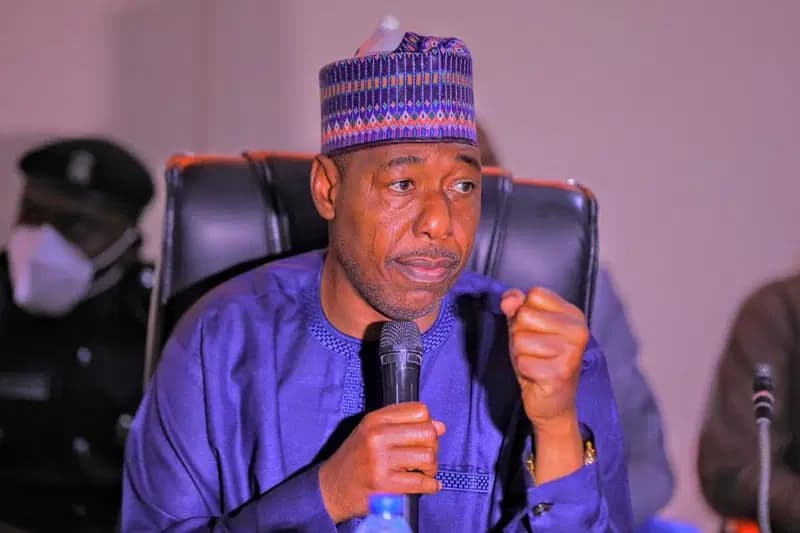In a decisive move to safeguard the environment and enhance public health, Borno State Governor Babagana Umara Zulum has introduced two groundbreaking executive orders aimed at tackling environmental degradation and improving sanitation across the state. Signed on May 16, 2025, these orders address critical issues of indiscriminate tree felling and public hygiene, signaling a robust commitment to sustainable development and community well-being. This blog post delves into the details of these transformative policies, their implications, enforcement mechanisms, and the broader context of environmental challenges in Borno State.
The First Executive Order: A Ban on Indiscriminate Tree Felling
The first executive order targets the rampant practice of tree felling, a significant contributor to environmental degradation in Borno State. Deforestation has long been a pressing issue in Nigeria’s northeastern region, where desertification, climate change, and human activities threaten the fragile ecosystem. Governor Zulum’s order explicitly prohibits the indiscriminate cutting of trees, aiming to preserve the state’s natural resources and mitigate the adverse effects of environmental decline.
Penalties for Non-Compliance
To ensure compliance, the executive order outlines stringent penalties for violators. First-time offenders face a fine of N250,000 or up to three years of imprisonment. For repeat offenders, the consequences are even more severe, with fines escalating to N500,000 or imprisonment for up to five years. These penalties underscore the government’s zero-tolerance stance on activities that jeopardize the environment.
The introduction of such hefty fines and prison terms is a bold statement, reflecting the urgency of addressing deforestation. Trees play a critical role in carbon sequestration, soil stabilization, and climate regulation, particularly in a region vulnerable to desert encroachment. By imposing strict consequences, the government aims to deter individuals and groups from engaging in unsustainable practices that exacerbate environmental challenges.
Why This Matters for Borno State
Borno State, located in Nigeria’s Sahel region, is particularly susceptible to the impacts of climate change. Desertification has already reduced arable land, threatening food security and livelihoods for millions of residents. The loss of tree cover exacerbates these issues, contributing to soil erosion, reduced rainfall, and increased temperatures. Governor Zulum’s order is a proactive step toward reversing this trend, aligning with national and global efforts to combat climate change and promote sustainable land use.
Moreover, the ban on tree felling has cultural and economic implications. Trees in Borno provide shade, fuelwood, and raw materials for local communities. However, unsustainable harvesting has depleted these resources, creating a cycle of scarcity. By protecting trees, the government not only preserves the environment but also ensures that future generations can benefit from these vital resources.
The Second Executive Order: Mandating Monthly Sanitation Exercises
The second executive order focuses on public health, mandating a monthly statewide sanitation exercise to improve hygiene and reduce the spread of diseases. This initiative reflects the government’s recognition of the link between environmental cleanliness and community well-being, particularly in a state recovering from years of conflict and displacement.
Details of the Sanitation Initiative
Under this order, residents and businesses are required to participate in a designated sanitation day each month. The exercise involves cleaning public spaces, clearing drainage systems, and disposing of waste properly. The goal is to create a cleaner, healthier environment that minimizes the risk of waterborne and vector-borne diseases, such as cholera and malaria, which thrive in unsanitary conditions.
To enforce compliance, the order imposes penalties for non-participation. First-time offenders face up to two years of imprisonment or a N100,000 fine, while repeat offenders could be jailed for up to five years. These measures highlight the government’s determination to instill a culture of civic responsibility and collective action in maintaining public health.
Addressing Public Health Challenges
Borno State has faced significant public health challenges, exacerbated by the Boko Haram insurgency, which displaced millions and strained infrastructure. Overcrowded displacement camps, inadequate sanitation facilities, and limited access to clean water have created breeding grounds for diseases. The monthly sanitation exercise is a strategic intervention to address these issues, fostering community participation and reducing the burden on the state’s healthcare system.
By institutionalizing sanitation days, the government also aims to change public behavior. Regular clean-up exercises can cultivate a sense of ownership among residents, encouraging them to take pride in their communities and maintain cleanliness beyond the designated days. This initiative complements existing efforts to rebuild Borno’s infrastructure and restore normalcy in the post-conflict era.
Enforcement and Additional Measures
To ensure the success of these executive orders, Governor Zulum has directed the Borno State Police Command and other relevant agencies to enforce compliance rigorously. This includes monitoring activities related to tree felling and ensuring participation in sanitation exercises. The involvement of law enforcement underscores the government’s commitment to translating policy into action.
Additionally, Zulum announced plans for a third executive order to address the issue of scrap metal scavenging, which has become a growing concern in the state. While details of this forthcoming order are yet to be released, it suggests a broader strategy to regulate activities that impact the environment and public safety.
The Bigger Picture: A Vision for Sustainable Development
Governor Zulum’s executive orders are more than just isolated policies; they are part of a comprehensive vision for sustainable development in Borno State. By addressing environmental degradation and public health simultaneously, the government is tackling interconnected challenges that affect the quality of life for its citizens.
Environmental Conservation as a Priority
The ban on tree felling aligns with Nigeria’s commitments under international frameworks like the Paris Agreement and the African Union’s Great Green Wall initiative, which aim to combat desertification and promote reforestation. Borno’s efforts to protect its tree cover contribute to these goals, positioning the state as a leader in environmental stewardship within Nigeria’s northeastern region.
Furthermore, the focus on tree preservation opens opportunities for complementary initiatives, such as afforestation programs, community forestry projects, and public awareness campaigns. These efforts could empower local communities to participate in conservation while creating jobs and alternative livelihoods.
Public Health as a Foundation for Recovery
The sanitation initiative is equally significant, particularly in the context of Borno’s recovery from conflict. A clean and healthy environment is essential for rebuilding communities, attracting investment, and improving the overall quality of life. By prioritizing public health, the government is laying the groundwork for long-term resilience and prosperity.
The emphasis on monthly sanitation exercises also has the potential to foster social cohesion. In a state where conflict has fractured communities, collective activities like clean-up days can bring people together, bridging divides and promoting unity.
Challenges and Opportunities
While these executive orders are commendable, their implementation will face challenges. Enforcement in rural and conflict-affected areas, where government presence is limited, could be difficult. Additionally, public awareness and buy-in will be critical to the success of both initiatives. The government must invest in education campaigns to inform residents about the importance of these policies and the consequences of non-compliance.
On the other hand, these orders present significant opportunities. The ban on tree felling could attract support from environmental organizations and international donors, providing resources for conservation projects. Similarly, the sanitation initiative could serve as a model for other Nigerian states, showcasing the impact of community-driven public health efforts.
Conclusion: A Step Toward a Greener, Healthier Borno
Governor Babagana Umara Zulum’s executive orders mark a turning point for Borno State, demonstrating a forward-thinking approach to environmental protection and public health. By banning indiscriminate tree felling and mandating monthly sanitation exercises, the government is addressing urgent challenges while laying the foundation for a sustainable future. These policies reflect a deep understanding of the interconnectedness of environmental and human well.
Join our Whatsapp channel to stay updated always!


